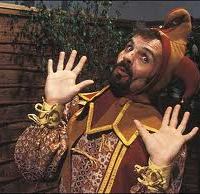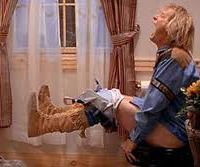Hillsborough (1996) – When you walk through a storm, hold your head up high…
Last week, the families of the 96 Liverpool fans crushed to death at Hillsborough stadium finally found out the truth, after 23 years of tireless campaigning.
Aside from the fans directly affected, the Hillsborough disaster touched most people in the UK’s lives. I didn’t even watch football at the time, but for some reason I was watching the 1989 semi-final between Liverpool and Nottingham Forest. I remember feeling more shocked by the Bradford stadium fire four years earlier, when a decrepit wooden stand caught fire and turned into an inferno in a matter of minutes.
I suppose the fire had a more visceral impact on a seven-year-old boy, as there’s not many things more horrific than seeing a football supporter stumbling across the pitch on fire. I didn’t truly appreciate the horror of Hillsborough until a few years later, when I was on the terraces as a fan, and felt my first crowd surge.
My friend and I started supporting our local football club, Ipswich Town, at the beginning of the 1991-92 season. It was a good season to start – that year, Town won the old Second Division championship and promotion to the newly formed Premier League.
We started off in the safe family seats of the Pioneer Stand, but by Christmas, as Town’s promotion charge gathered pace, we wanted a spot on the terraces with the big boys. That’s where the atmosphere was, and as a couple of lads in our early teens, we wanted to jump around, sing songs and hurl abuse at the referee too.
My mum wasn’t happy about the idea, as the memories of Hillsborough were fresh in everyone’s minds. But she let me go on the terraces on the condition I stood in the Churchman’s end, when the most boisterous fans stood in the North Stand.
Watching from the terraces was great. You go through the narrow turnstiles (fat bastards had to squeeze through the tiny gates sideways), grab your pie then up the steps into the stand. Churchmans at that time was just a large corrugated barn, with the shallow concrete steps and stationary steel crush barriers, which were great for leaning on.
The crowd packs in, and you’re surrounded. Most of the time, if you’re a shorty like me, you can’t see anything, but that’s OK because you’re too wrapped up in the shouting and singing to care much. It’s mostly blokes, and everyone round you stinks of booze and fags. Then your team scores, or an opposing player hacks your player, or the referee denies a clear penalty…
…you’re jumping up to call the referee a wanker or the opposing player a cunt, and the bodies around you surge forward, sometimes freezing you in mid-jump with your fist in the air. It’s scary and exhilarating, getting picked up and carried to another part of the stand by the combined force of thousands of people, your feet not even touching the ground. Then the excitement dies down and you’re deposited on a spot maybe ten feet away from where you started, and might have to find your mates again.
This is all good fun in a relatively benign situation. Portman Road is hardly a threatening ground, and the only way you could struggle getting onto the pitch in an emergency is if you’re about three-foot tall.
At Hillsborough, police allowed a build up of Liverpool fans through an exit tunnel into two central pens, surrounded by a high over-hanging steel fence. When the hundreds of extra fans surged into the already packed enclosures, the people at the front had nowhere to go. Most of the victims had the breath crushed out of them where they stood.
ITV’s 1996 drama Hillsborough is an extremely well-made and powerful made-for-TV film, written by Jimmy McGovern and directed by Charles McDougall, who also directed an episode of McGovern’s acclaimed crime drama Cracker.
McGovern’s screenplay narrows the focus to three families affected by the disaster: Trevor (Christopher Eccleston) and Jenni Hicks (Annabelle Apsion), a couple who lost both their daughters, while Ricky Tomlinson and Mark Womack play the fathers of victims Ian Glover and Adam Spearritt respectively.
The film doesn’t dither, opening with brief scenes of the principle characters as they excitedly prepare for the journey to the semi-final in Sheffield. Meanwhile, at Hillsborough, newly promoted Chief Superintendent Duckenfield (Maurice Roëves) of the South Yorkshire Police briefs his colleagues before the match, highlighting his determination to ensure fans without tickets don’t enter the ground.
Tickets play a prominent part of these opening moments, because the ticket issue plays a huge part in the Hillsborough tragedy. The South Yorkshire Police subsequently blamed the disaster on the Liverpool fans, claiming that drunk and violent supporters without tickets forced their way into the ground, causing the fatal crush.
There are other small details which are important: Trevor admonishes one of his daughters for making pig sounds at a passing police officer, hinting at the enmity between supporters and the police. The steel fences on terraces were erected in response to the growing hooligan problem at British football grounds during the 70’s and 80’s.
During Duckenfield’s briefing, it is clear the focus is on crowd control rather than crowd safety, and as the disaster unfolds, police on the pitch are slow to identify the problem as a deadly crush instead of crowd trouble.
Hillsborough doesn’t dwell on the build up of the crush, instead skipping forward from fans entering the stadium to the chaotic aftermath – untrained family and friends trying to resuscitate the injured on the pitch, fans rushing the dying to the stadium gym using advertising hoardings as stretchers.
McDougall’s decision to keep up close to the event is what gives Hillsborough its power in the early stages, creating a sense of disorientation, panic and dreadful intimacy with the victims.
While McGovern’s script clearly and rightly sides with the Liverpool fans, he’s a good enough writer to ensure he doesn’t simply write off all the police and slow-responding ambulance crews as cardboard villains. A scene shows tired and shocked officers sitting in a canteen after the disaster. Comforting hands are laid on young shoulders, but the words from their seniors indicate a conspiracy is already under way: “Don’t write anything in your reports.”
As good as McDougall’s work is depicting the escalating crisis, viewers who saw the real thing first time round on TV will likely be shaken by use of real footage. All those images that stuck in the mind so vividly twenty-three years ago reappear – supporters being hauled to safety by fans in the upper tier. Bodies rushed across the pitch on makeshift stretchers. Amid the chaos, a lone ambulance making its way through the panicking crowd.
The aftermath is even harder hitting. The Hicks couple, trying to enter the makeshift mortuary, are heartlessly told their daughter’s body doesn’t belong to them anymore. A mob of press photographers descend on a busload of devastated relatives, snapping the grieving family members through the windows.
The second half of the film focuses on the inquest into the Hillsborough disaster. The tabloid papers, most notoriously The Sun, have colluded with the police version of events, and smeared the Liverpool fans with vicious lies. The Sun‘s callous headline “The Truth”, with a story reporting Liverpool fans pickpocketing the dead and pissing on the cops, still ensures the paper doesn’t sell many copies on Merseyside.
The court room scenes are the weakest part of the film, although interspersed with harrowing moments at funerals, press harassment, and the effects of the tragedy on the families. Eccleston, always a dependable performer, and Apsion feature heavily, as the couple tirelessly striving for justice in public, but their marriage falling apart under the strain of their double loss.
Overlapping dialogue features heavily, creating a sense of raw and uncontrollable emotion as the families rail against the injustice laid at their door.
One of the worst decisions is the casting of Dr Popper, the coroner overseeing the inquest. Who is the worst person imaginable in that chair for a group of working class Liverpudlians seeking justice? How about Darth Vader’s boss, Emperor Palpatine himself, Ian McDiarmid? This is not fiction, and the result of the inquest won’t be any surprise, but the casting of McDiarmid in this role seems jarring.
McDiarmid hams it up, with his slithery diction, portraying the epitome of Establishment smugness and hypocrisy. At one point, when Joe Glover breaks down describing the events to the court, Popper has trouble understanding Scouse, and needs a court aide to translate.
The film ends without hope. Hillsborough is powerful and raw, made only just bearable with the recent findings of the Hillsborough Independent Panel providing some closure. It is daunting and angering to know that the families of the people killed needed to campaign a further sixteen years after the film’s first showing to finally obtain the truth.
This weekend’s football fixtures saw several sets of opposing football fans show support and solidarity in the wake of the revelations. Most touching was the tribute paid by Liverpool’s Merseyside rivals, Everton.
The big one will be when Manchester United visit Anfield next weekend. It’s hard typing with fingers crossed, but I hope with all my heart that the United fans will join in with Liverpool’s traditional rendition of You’ll Never Walk Alone before kick off, which will be especially poignant in their first home game after the Report.
The soul of football has been in jeopardy for quite a few years now. The sickening wealth, footballers out of touch with reality, racism charges, and repellent displays of tribalism, has caused many, including myself, to profess falling out of love with the game we fell so hard for when we were kids.
The families got the truth, and I hope on a wider scale that this dark chapter in football history will finally bring a ray of decency and honesty to the game, and unite the embittered factions of the world’s beloved, most tribal sport.
Posted on 18/09/2012, in Drama, Entertainment, Film, Football, H, Movies, Reviews, Sport and tagged Annabelle Apsion, Christopher Eccleston, Hillsborough disaster, Jimmy McGovern, Liverpool FC, Ricky Tomlinson, South Yorkshire Police. Bookmark the permalink. Leave a comment.










Leave a comment
Comments 0